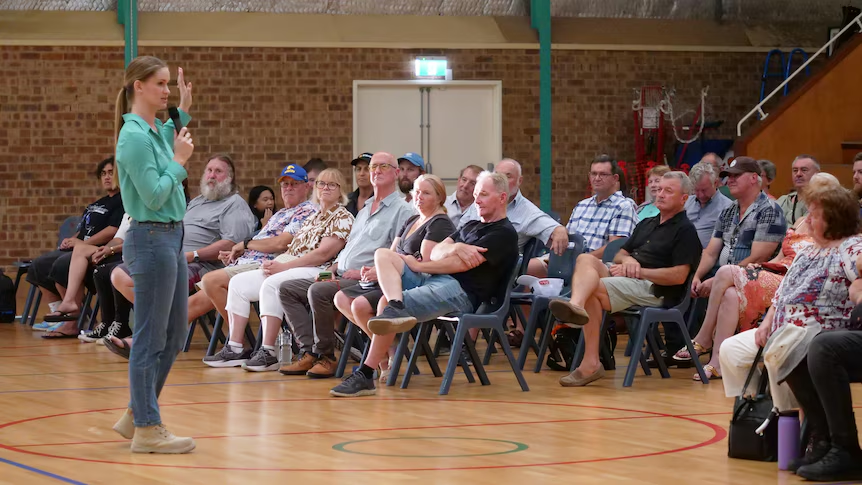In short:
A campaign by proponents of nuclear have funded former Miss America and engineer Grace Stanke’s pro-nuclear tour of Australia.
Attendees say they had mixed emotions to whether or not the campaign message was what locals needed to hear.
What’s Next?
The tour, funded by Australian electronics mogul, Dick Smith will see the 22-year-old visit locations around Australia over the next week, to advocate for a nuclear future.
Nuclear energy advocates have begun a national tour to win the hearts and minds of coal towns promised nuclear facilities by the opposition.
Last year, federal opposition leader Peter Dutton identified seven sites across the nation to transition coal-fired power stations into nuclear power plants.
The South West town of Collie, 200 kilometres south of Perth, is one of seven sites identified by Mr Dutton.
Collie was the first stop on the campaign, spearheaded by former Miss America and nuclear fuels engineer Grace Stanke.
The campaign, bankrolled by former electronics mogul, Dick Smith is aiming to address misconceptions and questions among coal mining communities.
Collie local and ex-farmer Ian Affleck attended the information session as a supporter of nuclear in Collie.
“I don’t believe renewables have a big space in where we are, it doesn’t ring right for me,” Mr Affleck said.
“There weren’t many young people in the crowd tonight. You have to have people from the outside come in so you don’t politicise it.
“I want to listen to a broad spectrum of people.”
Local Ian Affleck says he doesn’t believe in renewables. (ABC South West: Kate Forrester)
An unexpected advocate
Grace Stanke was joined by other nuclear energy experts on Thursday night to continue the energy debate, ahead of the upcoming federal election.
The nuclear fuels engineer and 2023 Miss America has also been listed in Forbes list as one of America’s most influential energy experts, aged under 30.
“I use my personal story to break misconceptions and talk about what happens to the waste, the safety, the cost, the build time for building nuclear,” Ms Stanke said.
“The most important thing [in this process] is having a questioning attitude. I think people were receptive tonight coming with the questions they wanted answered.”
Grace Stanke says she hopes to use her personal story to break misconceptions about nuclear energy. (ABC South West: Kate Forrester)
One of the points the American presented to the crowd was jobs being transferable.
“I think for this town specifically, a lot of the skills current coal workers have can translate into a nuclear power plant or multiple power plants,” she said.
About 100 members of the community attended the information session. (ABC South West: Kate Forrester)
Differing opinions
Greg Busson, Secretary of the Mining and Energy Union, went to the meeting on Thursday night.
He disagreed with Ms Stanke’s position on jobs being transferable from coal to nuclear but said hearing another perspective was always worth it.
“To an extent, I see the link she is making here to the current coal-powered station workers,” Mr Busson said.
“But majority of the workers I cover in Collie are coal miners. I don’t see where the link is there. They’ve never worked in a powerhouse.
Greg Busson says it was good to hear a different perspective. (ABC South West: Jonathon Daly)
“We don’t mine uranium, so where do those people fit in? What other industries are there that are linked to the nuclear industry that will give those coal workers comfort?”
Mr Busson said, looking around the hall, he thought a lot of the attendees had come from out of town.
“I think part of the problem is they portrayed Grace as a beauty queen, not just as a nuclear engineer,” Mr Busson said.
“The perception from a lot of the community is they were using beauty to brainwash.”
Opinions were divided at the Nuclear for Australia information night in Collie. (ABC South West: Kate Forrester)
Educating future generations
Stacey Love is a Bunbury local, which is a 58km drive from Collie. She took her daughter Grace to see Ms Stanke’s presentation.
“It was very informative for someone like my daughter. She’s right into engineering and science, and it’s important to hear for their generation,” Ms Love said.
Stacey Love (right) welcomes nuclear power. Pictured with her daughter, Grace Michael. (ABC South West: Kate Forrester)
“I’m one of those mothers who is into the future of the area, the 25-year plan, and I think this would be involved in that plan.”
Currently, in high school, Grace said Ms Stanke inspired her own passions.
“Like Grace [Stanke] spoke about, I have no idea what I want to do after school,” she said.
“But right now, I think nuclear is a good idea, all the raw materials are going to waste, we need to bring in new energy to help us expand.
Source: ABC News


